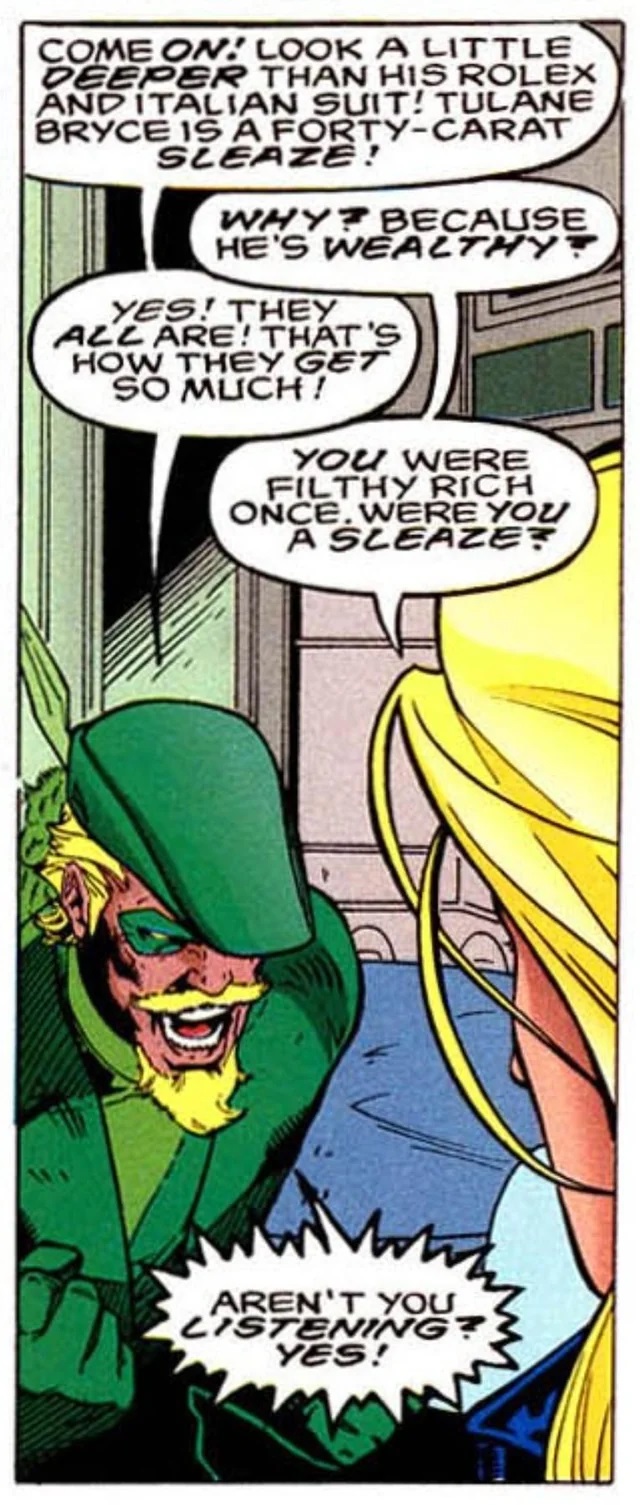
The Green Arrow, a seasoned superhero with a rich history, is often perceived as a mere imitation of Batman by many. To some extent, this assumption holds water given his initial portrayal mirrored that of the Dark Knight. Both characters share a common origin: wealthy individuals who trained to combat crime following a life-altering tragedy. However, over time, Green Arrow has evolved beyond being just a copycat and carved out his unique identity.
In the expansive DC universe filled with billionaires and even trillionaires, Green Arrow stands out as one of the few truly ethical characters.
Green Arrow initially embarked on his superhero journey as a wealthy individual, channeling his resources towards battling both street-level criminals and supervillains. However, this perspective shifted dramatically when comic books transitioned into the Silver Age, resulting in Oliver Queen losing his immense fortune. Experiencing life from the perspective of those who rely on the whims of the rich, Green Arrow became committed to combating social injustices and the imbalanced wealth distribution. He vowed to protect the underprivileged and address not just crime, but also the system that fosters it. In essence, he transformed into a crusader, striving to rectify not only wrongdoing, but also the root causes that allow such issues to persist.
Since the initial Green Lantern/Green Arrow series transformed Oliver’s character, his unwavering commitment to combating social injustice took root. This transformation saw him evolve from a typical hero safeguarding the populace, into an individual striving not just to save the world but also to significantly alter it. His methods of fighting for change echoed real-world struggles, rather than being confined to his own universe.
Green Arrow, for instance, advocated for Black Lightning’s admission as the Justice League’s first black superhero. He publicly criticized Green Lantern for apprehending a man defending himself against an unscrupulous landlord who intended to demolish their dilapidated building and displace everyone to make way for a parking lot. Moreover, he was vocal about the dangers of wealth consolidation, arguing that it empowered the rich at the expense of the oppressed, making those in power corrupt.

Over time, his battle against social injustice has become increasingly significant to him. Green Arrow is seen as a symbol of standing up against corrupt systems by activist communities, much like influential authors such as Ursula K. Le Guin are. It’s easy to understand why when you consider his accomplishments.
or
Throughout the years, his struggle against social injustice has become increasingly vital to him. Green Arrow is often perceived as a symbol of resisting corrupt systems within activist communities, similar to how authors like Ursula K. Le Guin are viewed. It’s clear why when you examine his actions.
Examine the ongoing All In run of the comic book, Green Arrow, starting from issue #18. Here, Oliver Queen delves into a baffling series of murders linked to Horton Chemical, a corporation with which he once had associations. Yet, amidst his investigation into these crimes, the story predominantly emphasizes the hazards that chemical companies pose to our environment. The initial scene for this story arc features a child playing near a pool of ominous black goop, oblivious to the fact that potentially harmful chemicals were hidden beneath his school’s playground. Regarding Oliver’s link with the company, he openly criticizes its executives for their harmful and appalling business practices that ultimately lead to fatalities. This aligns perfectly with Green Arrow’s character, who consistently champions issues that mirror real-world social concerns.

Indeed, it’s important to note that Green Arrow isn’t a flawless character; quite the contrary, he’s deeply imperfect. One of his most significant flaws was revealed in “Green Lantern/Green Arrow” #85, where it was discovered that his sidekick, Speedy, was addicted to heroin. Despite portraying himself as a righteous man eager to aid the oppressed, upon learning about Speedy’s addiction, Oliver Queen distanced himself from the boy he had helped raise and severed all ties. Yet, it is these imperfections that give Green Arrow his significance in his battle against injustice. In fact, the subsequent chapters of the All In arc delve into Green Arrow’s complicity in the wrongdoings committed by Horton Chemical and his struggle to rectify those mistakes, even if others refuse to acknowledge them.
Green Arrow is a character who battles against a corrupt system, despite his own imperfections. He isn’t striving for perfection or pretending to be so; instead, he faces real-world struggles much like ours, with the aim of finding a brighter future for all. He isn’t infallible and doesn’t always know the right path, but he consistently addresses issues that affect everyday people, attempting to improve their lives as best he can.
Though his wealth was initially acquired illicitly, Green Arrow uses every penny of it to bring about change, rather than wielding it like a weapon. Unlike Batman, who often employs his fortune in pursuit of a better future, Green Arrow views his wealth as a duty – something to be shared and used to enhance the lives of others. This perspective sets Oliver Queen apart as a more compassionate billionaire.
Read More
- PI PREDICTION. PI cryptocurrency
- Gold Rate Forecast
- Rick and Morty Season 8: Release Date SHOCK!
- Discover Ryan Gosling & Emma Stone’s Hidden Movie Trilogy You Never Knew About!
- Mission: Impossible 8 Reveals Shocking Truth But Leaves Fans with Unanswered Questions!
- SteelSeries reveals new Arctis Nova 3 Wireless headset series for Xbox, PlayStation, Nintendo Switch, and PC
- Discover the New Psion Subclasses in D&D’s Latest Unearthed Arcana!
- Linkin Park Albums in Order: Full Tracklists and Secrets Revealed
- Masters Toronto 2025: Everything You Need to Know
- We Loved Both of These Classic Sci-Fi Films (But They’re Pretty Much the Same Movie)
2025-04-21 19:17